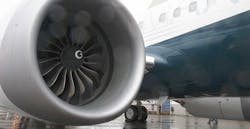GE Readies Engine Durability Fix for New Boeing, Airbus Planes
General Electric Co. plans to replace a part in hundreds of recently delivered engines after uncovering a durability problem inside the turbines powering the upgraded workhorse jets of Boeing Co. and Airbus SE.
The manufacturer has identified a fix for a previously disclosed issue with the new Leap engine, and the redesigned part will be incorporated into the production line starting in May, said Rick Kennedy, a spokesman for GE Aviation. More than 500 in-service engines, produced under GE’s CFM International joint venture with Safran SA, will be replaced or retrofitted during regular maintenance, he said.
While not expected to result in further delivery delays, the fix adds a new complication to an unprecedented production ramp-up in GE’s aerospace business as Boeing and Airbus increase output of their single-aisle jets. CFM’s shipments have been running about four weeks behind schedule as it tries to meet aggressive targets while fending off a challenge from United Technologies Corp.’s Pratt & Whitney, which has also experienced faults with a new engine.
GE rose 2.1% to $14.42 at the close in New York, the biggest gain in nearly a month. Boeing advanced 2.3% to $352.75.
Flaking Issue
The Leap problem, related to flaking of the coating on a shroud in the engine’s hot section, represents “a long-term durability issue,” Kennedy said. The glitch manifests in the “exhaust gas temperature margin,” according to a bulletin recently sent to operators.
The actual shroud is performing well, Kennedy said, but the coating was initially too thick. It’s not a safety or operational concern, it hasn’t resulted in any incidents and there are no planes currently grounded for Leap issues, he said.
The CFM engine is critical to a new generation of commercial jetliners, powering both the Boeing 737 Max and the Airbus A320neo. The Leap uses advanced materials such as ceramic-matrix composites to improve fuel efficiency over previous models.
The coating issue has led to the removal of about 40 Leaps from A320neo planes, CFM said in the operator bulletin. None of the engines used on the 737 Max were removed.
By Richard Clough and Julie Johnsson
About the Author
Bloomberg
Licensed content from Bloomberg, copyright 2016.
